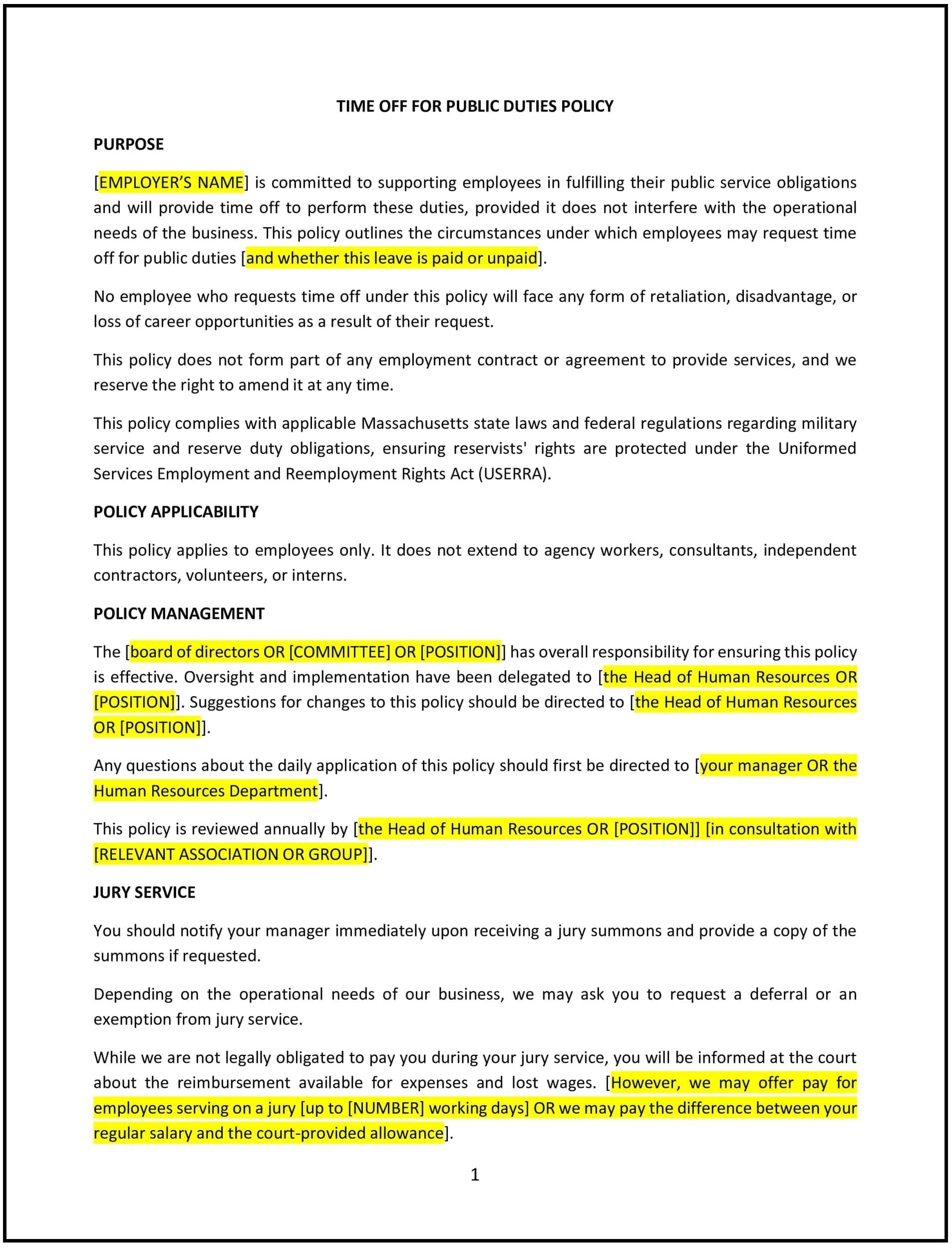Time off for public duties policy (Massachusetts): Free template
Got contracts to review? While you're here for policies, let Cobrief make contract review effortless—start your free review now.

Customize this template for free
This time off for public duties policy is designed to help Massachusetts businesses manage employees' absences related to public duties, such as jury duty, voting, or serving in public office. The policy outlines the company’s approach to granting time off for these activities while ensuring minimal disruption to business operations. It also helps businesses comply with Massachusetts state laws, which require certain types of public duties leave.
By adopting this policy, businesses can support employees’ civic responsibilities while maintaining productivity and ensuring fair treatment for all employees.
How to use this time off for public duties policy (Massachusetts)
- Define public duties: Specify the types of public duties covered by the policy, such as jury duty, voting, serving as a public official, or participating in community service programs. The policy should clarify which activities are eligible for time off and the duration of the leave.
- Outline the process for requesting time off: Provide clear instructions on how employees should request time off for public duties. Employees should be encouraged to notify their managers as soon as they are aware of their public duty obligations and follow the company’s process for submitting formal requests for time off.
- Address compensation during time off: The policy should specify whether employees will be compensated while serving in public duties. In Massachusetts, employees may be entitled to compensation for jury duty leave but not for other public duties. The policy should outline how compensation is handled, whether it is paid or unpaid.
- Set expectations for documentation: Employees should be required to provide documentation to verify their participation in public duties. For example, if an employee is called for jury duty, they may need to provide a summons or attendance record from the court.
- Ensure compliance with Massachusetts state law: The policy should comply with Massachusetts state laws, including the Massachusetts Jury Duty Leave Law, which guarantees time off for employees called to serve on a jury. It should also address any other applicable laws or regulations related to public duties.
- Address additional leave for public office: If an employee holds a public office or participates in public service, the policy should specify how time off for these duties will be handled. The company should outline whether additional leave will be granted and any related restrictions or conditions.
- Review and update regularly: Periodically review and update the policy to ensure it is compliant with changes in Massachusetts state laws, federal regulations, and the company’s operational needs.
Benefits of using this time off for public duties policy (Massachusetts)
This policy offers several benefits for Massachusetts businesses:
- Supports employee civic engagement: By allowing employees to fulfill their civic duties, businesses demonstrate support for their employees’ rights to participate in public activities such as voting and jury duty.
- Complies with state laws: The policy helps the business comply with Massachusetts state laws, including those that mandate leave for public duties such as jury service, avoiding legal risks and penalties.
- Promotes fairness and equity: By providing time off for public duties, businesses treat all employees equally, regardless of their public service obligations, ensuring fair treatment across the workforce.
- Increases employee satisfaction: Offering time off for public duties can enhance employee morale and satisfaction, as employees feel supported in fulfilling their civic responsibilities without financial or job-related penalties.
- Reduces workplace disruption: Clear guidelines on managing time off for public duties help businesses plan for potential absences, ensuring minimal disruption to daily operations while employees are away.
Tips for using this time off for public duties policy (Massachusetts)
- Communicate the policy clearly: Ensure that all employees are aware of the policy and understand how to request time off for public duties. Provide the policy in the employee handbook and review it during onboarding or regular training sessions.
- Monitor leave requests: Track employee time off related to public duties to ensure consistency in how requests are handled. Maintain a process for verifying the reason for leave and ensuring that it complies with the policy.
- Plan for business continuity: When an employee takes time off for public duties, ensure that the employee’s responsibilities are managed appropriately in their absence. This may involve redistributing tasks or ensuring that other team members are prepared to cover.
- Provide support for documentation: Make it easy for employees to submit the necessary documentation, such as jury duty summonses or other verification, to avoid delays in processing time off requests.
- Respect employees' civic responsibilities: Encourage employees to fulfill their public duties without the fear of losing income or facing workplace retaliation. Promote a culture of respect for employees' legal and civic responsibilities.
- Review and update regularly: Periodically review the policy to ensure it is compliant with Massachusetts state laws, federal regulations, and the company’s evolving needs. Update the policy as needed to reflect changes in the law or company practices.